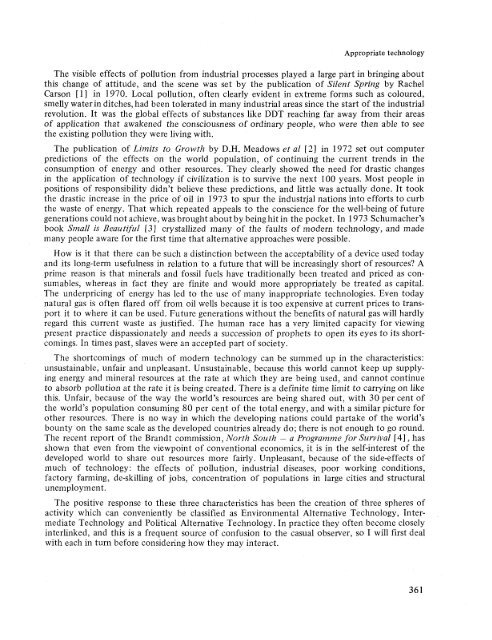New trends in physics teaching, v.4; The ... - unesdoc - Unesco
New trends in physics teaching, v.4; The ... - unesdoc - Unesco
New trends in physics teaching, v.4; The ... - unesdoc - Unesco
You also want an ePaper? Increase the reach of your titles
YUMPU automatically turns print PDFs into web optimized ePapers that Google loves.
Appropriate technology<br />
<strong>The</strong> visible effects of pollution from <strong>in</strong>dustrial processes played a large part <strong>in</strong> br<strong>in</strong>g<strong>in</strong>g about<br />
this change of attitude, and the scene was set by the publication of Silent Spr<strong>in</strong>g by Rachel<br />
Carson [ 11 <strong>in</strong> 1970. Local pollution, often clearly evident <strong>in</strong> extreme forms such as coloured,<br />
smelly water <strong>in</strong> ditches, had been tolerated <strong>in</strong> many <strong>in</strong>dustrial areas s<strong>in</strong>ce the start of the <strong>in</strong>dustrial<br />
revolution. It was the global effects of substances like DDT reach<strong>in</strong>g far away from their areas<br />
of application that awakened the consciousness of ord<strong>in</strong>ary people, who were then able to see<br />
the exist<strong>in</strong>g pollution they were liv<strong>in</strong>g with.<br />
<strong>The</strong> publication of Limits to Growth by D.H. Meadows et al 121 <strong>in</strong> 1972 set out computer<br />
predictions of the effects on the world population, of cont<strong>in</strong>u<strong>in</strong>g the current <strong>trends</strong> <strong>in</strong> the<br />
consumption of energy and other resources. <strong>The</strong>y clearly showed the need for drastic changes<br />
<strong>in</strong> the application of technology if civilization is to survive the next 100 years. Most people <strong>in</strong><br />
positions of responsibility didn’t believe these predictions, and little was actually done. It took<br />
the drastic <strong>in</strong>crease <strong>in</strong> the price of oil <strong>in</strong> 1973 to spur the <strong>in</strong>dustrjal nations <strong>in</strong>to efforts to curb<br />
the waste of energy. That which repeated appeals to the conscience for the well-be<strong>in</strong>g of future<br />
generations could not achieve, was brought about by be<strong>in</strong>g hit <strong>in</strong> the pocket. In 1973 Schumacher’s<br />
book Small is Beautiful C31 crystallized many of the faults of modern technology, and made<br />
many people aware for the first time that alternative approaches were possible.<br />
How is it that there can be such a dist<strong>in</strong>ction between the acceptability of a device used today<br />
and its long-term usefulness <strong>in</strong> relation to a future that will be <strong>in</strong>creas<strong>in</strong>gly short of resources? A<br />
prime reason is that m<strong>in</strong>erals and fossil fuels have traditionally been treated and priced as consumables,<br />
whereas <strong>in</strong> fact they are f<strong>in</strong>ite and would more appropriately be treated as capital.<br />
<strong>The</strong> underpric<strong>in</strong>g of energy has led to the use of many <strong>in</strong>appropriate technologies. Even today<br />
natural gas is often flared off from oil wells because it is too expensive at current prices to transport<br />
it to where it can be used. Future generations without the benefits of natural gas wil hardly<br />
regard this current waste as justified. <strong>The</strong> human race has a very limited capacity for view<strong>in</strong>g<br />
present practice dispassionately and needs a succession of prophets to open its eyes to its shortcom<strong>in</strong>gs.<br />
In times past, slaves were an accepted part of society.<br />
<strong>The</strong> shortcom<strong>in</strong>gs of much of modern technology can be summed up <strong>in</strong> the characteristics:<br />
unsusta<strong>in</strong>able, unfair and unpleasant. Unsusta<strong>in</strong>able, because this world cannot keep up supply<strong>in</strong>g<br />
energy and m<strong>in</strong>eral resources at the rate at which they are be<strong>in</strong>g used, and cannot cont<strong>in</strong>ue<br />
to absorb pollution at the rate it is be<strong>in</strong>g created. <strong>The</strong>re is a def<strong>in</strong>ite time limit to carry<strong>in</strong>g on like<br />
this. Unfair, because of the way the world’s resources are be<strong>in</strong>g shared out, with 30 per cent of<br />
the world’s population consum<strong>in</strong>g 80 per cent of the total energy, and with a similar picture for<br />
other resources. <strong>The</strong>re is no way <strong>in</strong> which the develop<strong>in</strong>g nations could partake of the world’s<br />
bounty on the same scale as the developed countries already do; there is not enough to go round.<br />
<strong>The</strong> recent report of the Brandt commission, North South - a Programme for Survival 141, has<br />
shown that even from the viewpo<strong>in</strong>t of conventional economics, it is <strong>in</strong> the self-<strong>in</strong>terest of the<br />
developed world to share out resources more fairly. Unpleasant, because of the side-effects of<br />
much of technology: the effects of pollution, <strong>in</strong>dustrial diseases, poor work<strong>in</strong>g conditions,<br />
factory farm<strong>in</strong>g, de-skill<strong>in</strong>g of jobs, concentration of populations <strong>in</strong> large cities and structural<br />
unemployment .<br />
<strong>The</strong> positive response to these three characteristics has been the creation of three spheres of<br />
activity which can conveniently be classified as Environmental Alternative Technology, Intermediate<br />
Technology and Political Alternative Technology. In practice they often become closely<br />
<strong>in</strong>terl<strong>in</strong>ked, and this is a frequent source of confusion to the casual observer, so I will first deal<br />
with each <strong>in</strong> turn before consider<strong>in</strong>g how they may <strong>in</strong>teract.<br />
36 1
















